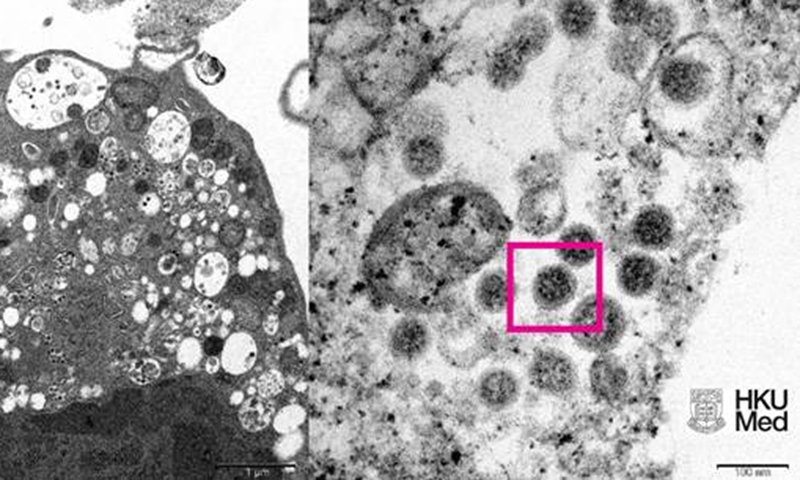
HKUMed reveals the electron microscope image of SARS-CoV-2 Omicron variant. Photo: HKUMed
The Global Times learned the news from the National Institute for Viral Disease Control and Prevention with Chinese Center for Disease Control and Prevention (China CDC), and researchers from the University of Hong Kong on Friday.
After obtaining the Omicron strain isolated and cultured from the University of Hong Kong, researchers at China CDC will launch further studies on the mutated variant, including the evaluation of its transmissibility, immune escape and pathogenicity, which will later provide strong support and help for subsequent vaccine and drug research and development, Wu Guizhen, a chief expert from the National Institute for Viral Disease Control and Prevention told the Global Times.
Obtaining the Omicron mutant strain is a prerequisite to verifying the effectiveness of existing vaccines and to develop an inactivated vaccine against Omicron.
Since the research team led by Yuen Kwok-yung from the University of Hong Kong succeeded in isolating the Omicron variant from clinical specimens, they expressed the willingness to share the results with the mainland. The successful strain delivery from Hong Kong to Beijing could be made thanks to the efforts of multiple departments including the National Health Commission, the Hong Kong SAR government and Beijing anti-terrorism office, Wu said.
Yuen's team announced they succeeded in isolating the Omicron variant from clinical specimens on November 29, becoming the first team in Asia that isolated and cultured the Omicron variant.
Jin Dongyan, a biomedical professor at the University of Hong Kong, told the Global Times on Friday that the research teams are also ramping up efforts to study the transmissibility and pathogenicity of the Omicron strain. In experiments, hamsters artificially infected with the virus were placed next to healthy animals to study the transmissibility and pathogenicity of the strain, Jin noted.
Liu Jingzhen, chairman of the China National Pharmaceutical Group (Sinopharm), said on Thursday that Sinopharm together with the China National Biotec Group has mapped out the R&D of vaccines against the Omicron strain in three technical routes.



